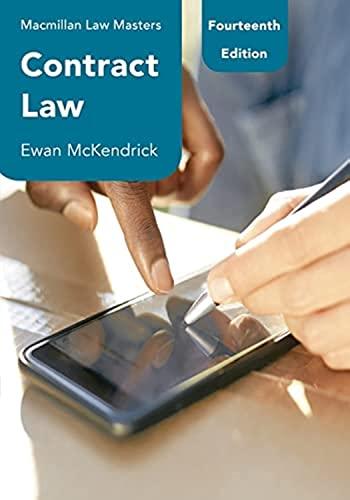Question
List the proper sections of an appellate brief along with a general summary of the content and purpose/goal of each section. When Kant returned to
List the proper sections of an appellate brief along with a general summary of the content and purpose/goal of each section. When Kant returned to the store, his intention was to exchange the Handel's beans he had previously purchased for Hoover's beans. The state would have difficulty proving that Kant had the intent to permanently deprive the store of the beans because it is common practice for grocery stores to accept exchanges of unopened canned goods. If Kant had asked for the store's permission, it is highly likely that it would have been granted without any hesitation. The established customs and practices of the grocery industry would negate any suggestion of intent to permanently deprive, thereby making Kant not guilty of theft. Moving on to the next situation, when Kant placed the Hoover's beans in the shopping cart, he intended to exchange them for the Handel's beans. Assuming that the two products are of equal price (as there is no information suggesting otherwise), Kant's aim was to make a fair exchange. However, instead of completing the exchange, he ended up donating the beans to a charitable food drive. One could argue that by placing the beans in the community food drive cart, Kant potentially permanently deprived Bilmart of its case of Hoover's beans. However, it is important to consider that Kant genuinely believed the cart was designated for store returns. Therefore, not only did he lack the intention to permanently deprive Bilmart of the beans for the exchange, but he also had no intention to make a contribution to a food drive. Considering all legal theories and perspectives, it is evident that Kant should not be found guilty of petty theft, and his conviction must be reversed. The circumstances surrounding his actions, such as the common acceptance of exchanges in grocery stores and his genuine belief regarding the purpose of the food drive cart, support the conclusion that he did not engage in theft or any wrongful act.
Step by Step Solution
There are 3 Steps involved in it
Step: 1

Get Instant Access to Expert-Tailored Solutions
See step-by-step solutions with expert insights and AI powered tools for academic success
Step: 2

Step: 3

Ace Your Homework with AI
Get the answers you need in no time with our AI-driven, step-by-step assistance
Get Started


